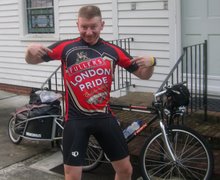‘Tungjatjeta’ from Shkoder - a medium sized, attractive city in the northern Albania. It is considered the cultural capital of Albania and boasts the largest Mosque in the country and the biggest Catholic Church in the Balkans. In a region of such ethnic intolerance, Shkoder (Albania in general) could provide a lesson in living together respectfully. Shkoder is also one of the rare cities in the world that have both lakeside and mountain climates side-by-side: The city sits on Lake Shkoder, the largest lake in the Balkans, and is overlooked by the western end of the Accursed Mountains.
Lake Shkoder is divided between Albania and Montenegro with only 1/3 in Albania. Adding to Shkoder’s natural surroundings are three rivers, Kiri, Drini and Buna, which confluence at the southern end of the city. This is all overlooked by the ruins of Kalaja Rozafa (castle), within whose walls a fair maiden, Rozafa, was buried alive during construction in order to fortify the walls (according to local legend).
There are two borders
When living in Tirana, upon asking a question about Albania I was always greeted with a question preceding the answer: “Are you asking about Tirana or Albania in general?” Prior observations had already confirmed the answers would be different. Despite the stunning natural beauty of the country as a whole and the outstandingly friendly and helpful people, life outside Tirana is significantly different. Gone are the (relatively) bright lights, late night cafes/clubs, hubbub, bridal shops (yes, there are lots of them), wealth, and energy associated with capital cities. Replaced instead with rural landscapes, more obvious signs of poverty, a lethargy and especially in small, rural towns, a ‘look’ of hardship etched on the faces of the inhabitants. Life in many of these small villages I am sure is tough. Trash litters the roadsides and (as in Tirana) to the uninitiated the only two rules of the road are:
Do what you want
Don’t hit anything
That said, many Shkodrans cycle. Far more than in Tirana. Presumably a combination of a) less chance of being prematurely sent to your grave as a result of decreased traffic volumes and b) the lower income levels, making vehicles less affordable. The main road into Shkoder from Tirana is, to put it mildly, appalling. However, to be fair, this appears to be due to a large sewer (I assume) pipe being laid down the middle of it. The questions with unknown answers are:
1. When will the work be finished?
2. Will there be enough money to complete the work and return the road to an acceptable state?
This though does present the intrepid cyclist with the chance to sprint up the inside of cars, leaving them in my dust, weaving in and out of potholes with forward momentum only occasionally thwarted by gravel-traps. All good training.
However, there are many things to enjoy about Albania (whether in Tirana or the ‘country’): Fruit and
As for the YMCA in Shkoder: It was founded in 2001 and has been actively serving the local community since. The main program is serving the Roma (gypsy) community
It is in this context, the YMCA caters for the needs of 250 Roma children age 5-14 years. Services to this population include the most basic human needs: providing clothing and food. The YMCA also supplies sports equipment, learning materials and occasional day trips/picnics for the children. All this is accomplished with a budget of €5000/$6500 per year.
Recently the YMCA participated in an 'educational walk' as part of the 'Leave no child out campaign'. This was a local activity raising awareness of the children that are being left behind without access to formal education and had significant media coverage and top regional officials present. As mentioned last time, the latest development in this project is that the YMCA and local education
Having been here two weeks, and with the support of YMCA Europe and YMCA of the USA, all attention and available resources are being focussed on developing YMCA Shkoder (while still serving/helping our YMCA friends in Tirana).
Therefore, the plan of action for my remaining stay is three-fold at this point
· Develop an ‘internationally-recognized’ NGO governance/operating structure for YMCA Shkoder
· Focus YMCA efforts on the completion and sustainability of the new Roma school program and creation of a Youth Center in Shkoder, while taking advantage of other ongoing opportunities (summer camps, etc.)
· Hold the national General Assembly
Specific steps in the Operational Development Plan for YMCA Shkoder include:
1) Creating a YMCA purpose statement and logo
2) Developing Bye-laws and Constitution
3) Developing a local board of advisors
4) Orienting YMCA leaders and volunteers on History/function of YMCA:
5) Creating Program goals
6) Developing goals and timeline/targets for 2007-2009
7) Relationship building with potential partners
With this forming the backdrop of our ongoing work, the next major initiative of YMCA Shkoder is to create the Youth Centre I referred to last time. The plan is to raise 20% (approximately US$15,000/£8,000/€12,000) of necessary funds here within Albania with the rest being secured from international donations (individual/business contributions and grants). While the amount to be generated within Albania does not seem high compared with Western/Northern standards, when you consider that the average salary in Albania is a mere US$190/£100/€150 per month, it will be quite a challenge.
As far as the Balkan-Baltic sponsored bicycle-ride portion of fundraising is concerned, the goal is US$20,000/£12,000/€16,000. The route is finalized, necessary visas applied for, website and links created, training well underway and host YMCAs notified. Promotional materials will be distributed by the end of next week.
Stay tuned for more from the Land of the Eagle. Best wishes to you all and thanks to all of you who reply to these updates and keep me posted on what is happening back ‘home’ – wherever that may be.
Mirupafshim,
Ian Luck

No comments:
Post a Comment